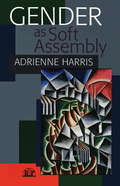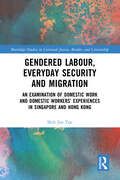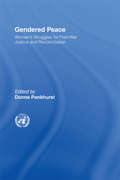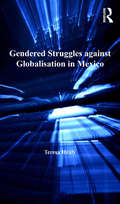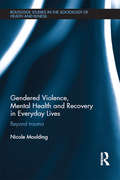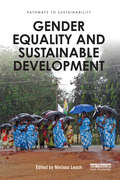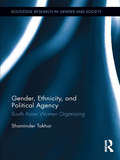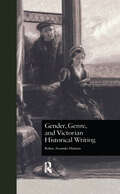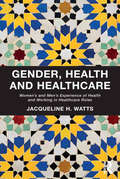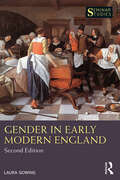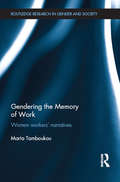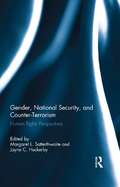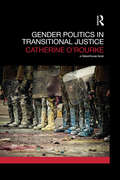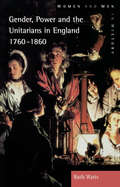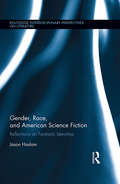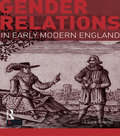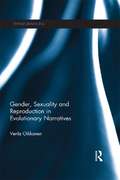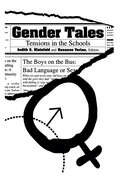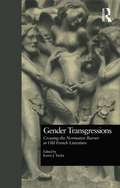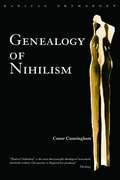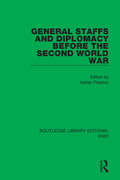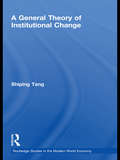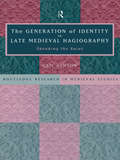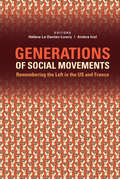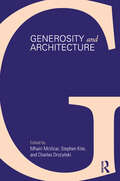Special Collections
Benetech’s Global Certified Accessible Titles
Description: Benetech’s GCA program is the first independent third-party EPUB certification to verify ebook accessibility. By creating content that is born accessible, publishers can meet the needs of all readers. Learn more: https://bornaccessible.benetech.org/
- Table View
- List View
Gender as Soft Assembly
by Adrienne HarrisGender as Soft Assembly weaves together insights from different disciplinary domains to open up new vistas of clinical understanding of what it means to inhabit, to perform, and to be, gendered. Opposing the traditional notion of development as the linear unfolding of predictable stages, Adrienne Harris argues that children become gendered in multiply configured contexts. And she proffers new developmental models to capture the fluid, constructed, and creative experiences of becoming and being gendered. According to Harris, these models, and the images to which they give rise, articulate not only with contemporary relational psychoanalysis but also with recent research into the origins of mentalization and symbolization.In urging us to think of gender as co-constructed in a variety of relational contexts, Harris enlarges her psychoanalytic sensibility with the insights of attachment theory, linguistics, queer theory, and feminist criticism. Nor is she inattentive to the impact of history and culture on gender meanings. Special consideration is given to chaos theory, which Harris positions at the cutting edge of developmental psychology and uses to generate new perspectives and new images for comprehending and working clinically with gender.
Gendered Labour, Everyday Security and Migration
by Shih Joo TanDrawing on original empirical research from Singapore and Hong Kong, Gendered Labour, Everyday Security and Migration interrogates women migrant domestic workers’ experiences of work and workplace exploitation. It examines the ways in which these women negotiate everyday security and safe work against the backdrop of affective employment relations and institutional structures of labour and migration law. It challenges the current emphasis on the language of exploitation and legal approaches to identifying, understanding and rectifying poor employment conditions for women migrant domestic workers. This book addresses the limited research literature that examines the extent to which regulatory or criminal justice responses are relevant to, and utilised by, women migrant domestic workers in their everyday negotiation of safe work and offers a unique contribution to the field. An accessible and compelling read, it will be of interest to researchers from across the fields of criminology, sociology, labour migration studies and women’s studies.
Gendered Peace
by Donna PankhurstThis volume contributes to the growing literature on women, conflict and peacebuilding by focusing on the moments after a peace accord, or some other official ending of a conflict, often denoted as ‘post-conflict’ or ‘post-war’. Such moments often herald great hope for holding to account those who committed grave wrongs during the conflict, and for a better life in the future. For many women, both of these hopes are often very quickly shattered in starkly different ways to the hopes of men. Such periods are often characterized by violence and insecurities, and the official ending of a war often fails to bring freedom from sexual violence for many women. Within such a context, efforts on the part of women, and those made on their behalf, to hold to account those who commit crimes against them, and to access their rights are difficult to make, are often dangerous, and are also often deployed with little effect. Gendered Peace explores international contexts, and a variety of local ones, in which such struggles take place, and evaluates their progress. The volume highlights the surprising success in the development of international legal advances for women, but contrasts this with the actual experience of women in cases from Sierra Leone, Rwanda, South Africa, Afghanistan, Bangladesh, East Timor, Peru, Central America and the Balkans.'
Gendered Struggles against Globalisation in Mexico
by Teresa HealyTeresa Healy here examines resistance within Mexican society during a period of sustained crisis at the regional and national level, as well as at the level of world order. She analyzes how working class men organized to fight for the recognition of their citizenship rights, how they defended those rights when faced with repression and economic restructuring and how they contested the terms of globalization as it wrested from them their masculine identity of 'worker-fathers'. Healy also demonstrates how these men battled employers and masculinized political power at every level within the state to maintain their livelihoods and resist the feminization of their work and their own identities. These were gendered struggles against globalizations as they were experienced and carried out by men. The volume uncovers the limits and possibilities of working class men and women in transforming the conditions in which they live and work, and highlights the diversity and rich political history of social movements in Mexico.
Gendered Violence, Abuse and Mental Health in Everyday Lives
by Nicole MouldingGendered Violence, Abuse and Mental Health in Everyday Lives: Beyond Trauma offers new insights into the social dimensions of emotional distress in abuse-related mental health problems, and explores the many interconnections between gendered violence, different forms of abuse and poor mental health. Looking at how individuals can overcome the impact of abuse over the course of their lives, Moulding maps a feminist-informed recovery-oriented approaches to therapy and prevention. Drawing on sociological perspectives and a wide range of international research, as well as original qualitative data presented here for the first time, this book: -Demonstrates how gender and other social power relations play out in the specific emotional dimensions of some of the mental health problems most strongly linked to abuse, including post-traumatic stress disorder, anxiety, depression and eating disorders; -Critiques the way that mainstream psychological theory and research pathologises the effects of abuse through various mental illness diagnoses, obscuring the nature of the individual emotional distress involved, its social context and relational nature; -Outlines a feminist-informed, recovery-oriented approach that aims to reduce violence against women and children. This innovative volume is an important contribution to the literature on the impact of violence and abuse on the lives and health of its survivors. It will be of interest to students and researchers from a range of disciplines and professions, including social work, gender studies, sociology, social policy, psychology, counselling, mental health, public health, medicine and nursing.
Gender Equality and Sustainable Development
by Melissa LeachFor pathways to be truly sustainable and advance gender equality and the rights and capabilities of women and girls, those whose lives and well-being are at stake must be involved in leading the way. Gender Equality and Sustainable Development calls for policies, investments and initiatives in sustainable development that recognize women’s knowledge, agency and decision-making as fundamental. Four key sets of issues - work and industrial production; population and reproduction; food and agriculture, and water, sanitation and energy provide focal lenses through which these challenges are considered. Perspectives from new feminist political ecology and economy are integrated, alongside issues of rights, relations and power. The book untangles the complex interactions between different dimensions of gender relations and of sustainability, and explores how policy and activism can build synergies between them. Finally, this book demonstrates how plural pathways are possible; underpinned by different narratives about gender and sustainability, and how the choices between these are ultimately political. This timely book will be of great interest to students, scholars, practitioners and policy makers working on gender, sustainable development, development studies and ecological economics.
Gender, Ethnicity and Political Agency
by Shaminder TakharThis book examines how South Asian women’s collective agency is operationalized through civic organizations in the UK. Drawing on black feminist theory and third world feminism, it shows the complexity of political agency and its relationship to identity and subjectivity, and uses empirical research to demonstrate how women are empowered to resist domination. The historically racialized image of the South Asian woman as lacking in political agency is challenged through their long history of activism on the Indian subcontinent. The creation of "critical spaces" by South Asian women in the diaspora places them as active agents who have successfully influenced social policy on important issues such as forced marriage, domestic violence and sexuality. The engagement with the empirical data demonstrates the significance and impact of race, racism, sexism and religion on the lives of the women. The book brings to the fore the pursuit of equality, rights and justice, including multiculturalism and the often debated emancipatory role of religion.
Gender, Genre, and Victorian Historical Writing
by Rohan Amanda MaitzenFirst published in 1999. Routledge is an imprint of Taylor & Francis, an informa company.
Gender, Health and Healthcare
by Jacqueline H. WattsHealth status and the experience of working in health care roles are both strongly shaped by gender and, although there have been attempts to incorporate ’gender awareness’ in both health and employment policies, the significance of gender in these areas continues to be marginalised within public debates and academic discourses. Taking a social constructionist perspective, Watts considers the ways in which gender impacts upon health in all its elements including access, technology, professionalisation, health promotion and health as an important sector of the labour market. She discusses gender as a developing and diversified category, exploring ideas about masculinity and the fluidity of gender boundaries in determining individual identity. Chapters that follow discuss men’s and women’s health; ideology of gender and health, specifically exploring different social norms and ideas about male and female health and the dominant ideological association between femaleness and caring; working for health with particular focus on the gendered interplay of caring and curing roles; technology and changes to gender, health and healthcare; health promotion as a gendered activity and, finally, the importance of introducing an intersectional approach beyond gender to articulate a deeper understanding of health in a postmodern context. The concluding chapter draws together these themes to underscore the importance of placing gender at the centre of health and health care delivery to fully take account of both the different life and health experiences of men and women and the gendered dimensions of working in health care.
Gender in Early Modern England
by Laura GowingThis concise and stimulating book explores the history of gender in England between 1500 and 1700. The second edition has been thoroughly revised to include new material on global connections, masculinity and recent historiography. Amid the upheavals of the Reformation and Civil Wars, gender was political. Sexual difference and women’s roles were matters of public debate, while social and economic changes were impacting on work, family and marriage. The rich archives of law, state and family testify to the complex configurations of patriarchal order and resistance to it. Gender in Early Modern England provides insight into gender relations in a time when a stark hierarchy of gender co-existed with a surprising degree of female capacity, great potential for challenge and confrontation, and a persistent sense of the mystery of the body. Documents include early feminist argument, law, midwives’ books, recipes, protest, sexual insults, cross-dressers, women escaping slavery, royal favourites and petitions. With a chronology, who’s who, glossary, guide to further reading and previously unpublished archival documents, Gender in Early Modern England is the perfect resource for all students interested in the history of women and gender in England between 1500 and 1700.
Gendering the Memory of Work
by Maria TamboukouThis book explores gendered aspects in the memory of work by looking at auto/biographical narratives and political writings of women workers in the garment industry. The author draws on cutting edge theoretical approaches and insights in memory studies, neo-materialism and discourse analysis, particularly looking at entanglements and intra-actions between places, bodies and objects. Tamboukou aims to enrich our appreciation of the role of women’s labour history in the wider realm of cultural memory, as well as in the politics of women’s work. The book addresses a significant gap in the literature by focusing on the memory of work from a gendered perspective. It also examines the relationship between workspaces and personal spaces: the intimate, intense and often invisible ways through which workers occupy workspaces and populate them with their ideas, emotions, beliefs, habits and everyday practices. The book will be a theoretical and methodological toolbox for students and researchers in the interface of the social sciences and the humanities, as well as a vital resource in women’s labour history. It will be particularly relevant for sociologists, cultural theorists, feminist scholars and social historians.
Gender, National Security, and Counter-Terrorism
by Margaret L. Satterthwaite and Jayne C. HuckerbyIn the name of fighting terrorism, countries have been invaded; wars have been waged; people have been detained, rendered and tortured; and campaigns for "hearts and minds" have been unleashed. Human rights analyses of the counter-terrorism measures implemented in the aftermath of 11 September 2001 have assumed that men suffer the most—both numerically and in terms of the nature of rights violations endured. This assumption has obscured the ways that women, men, and sexual minorities experience counter-terrorism. By integrating gender into a human rights analysis of counter-terrorism—and human rights into a gendered analysis of counter-terrorism—this volume aims to reverse this trend. Through this variegated human rights lens, the authors in this volume identify the spectrum and nature of rights violations arising in the context of gendered counter-terrorism and national security practices. Introduced with a foreword by Martin Scheinin, former UN Special Rapporteur on Human Rights and Counter-Terrorism, the volume examines a wide range of gendered impacts of counter-terrorism measures that have not been theorized in the leading texts on terrorism, counter-terrorism, national security, and human rights. Gender, National Security and Counter-Terrorism will be of particular interest to scholars and students in the disciplines of Law, Security Studies and Gender Studies.
Gender Politics in Transitional Justice
by Catherine O'RourkeWhat role do transitional justice processes play in determining the gender outcomes of transitions from conflict and authoritarianism? What is the impact of transitional justice processes on the human rights of women in states emerging from political violence? Gender Politics in Transitional Justice argues that human rights outcomes for women are determined in the space between international law and local gender politics. The book draws on feminist political science to reveal the key gender dynamics that shape the strategies of local women’s movements in their engagement with transitional justice, and the ultimate success of those strategies, termed ‘the local fit’. Also drawing on feminist doctrinal scholarship in international law, ‘the international frame’ examines the role of international law in defining harms against women in transitional justice and in determining the ‘from’ and ‘to’ of transitions from conflict and authoritarianism. This book locates evolving state practice in gender and transitional justice over the past two decades within the context of the enhanced protection of women’s human rights under international law. Relying on original empirical and legal research in Chile, Northern Ireland and Colombia, the book speaks more broadly to the study of gender politics and international law in transitional justice.
Gender, Power and the Unitarians in England, 1760-1860
by Ruth WattsThis new study explores the role the Unitarians played in female emancipation. Many leading figures of the late eighteenth and early nineteenth centuries were Unitarian, or were heavily influenced by Unitarian ideas, including: Mary Wollstonecraft, Elizabeth Gaskell, George Eliot, and Florence Nightingale. Ruth Watts examines how far they were successful in challenging the ideas and social conventions affecting women. In the process she reveals the complex relationship between religion, gender, class and education and her study will be essential reading for those studying the origins of the feminist movement, nineteenth-century gender history, religious history or the history of education.
Gender, Race, and American Science Fiction
by Jason HaslamThis book focuses on the interplay of gender, race, and their representation in American science fiction, from the nineteenth-century through to the twenty-first, and across a number of forms including literature and film. Haslam explores the reasons why SF provides such a rich medium for both the preservation of and challenges to dominant mythologies of gender and race. Defining SF linguistically and culturally, the study argues that this mode is not only able to illuminate the cultural and social histories of gender and race, but so too can it intervene in those histories, and highlight the ruptures present within them. The volume moves between material history and the linguistic nature of SF fantasies, from the specifics of race and gender at different points in American history to larger analyses of the socio-cultural functions of such identity categories. SF has already become central to discussions of humanity in the global capitalist age, and is increasingly the focus of feminist and critical race studies; in combining these earlier approaches, this book goes further, to demonstrate why SF must become central to our discussions of identity writ large, of the possibilities and failings of the human —past, present, and future. Focusing on the interplay of whiteness and its various 'others' in relation to competing gender constructs, chapters analyze works by Nathaniel Hawthorne, Mary E. Bradley Lane, Edgar Rice Burroughs, Philip Francis Nowlan, George S. Schuyler and the Wachowskis, Frank Herbert, William Gibson, and Octavia Butler. Academics and students interested in the study of Science Fiction, American literature and culture, and Whiteness Studies, as well as those engaged in critical gender and race studies, will find this volume invaluable.
Gender Relations in Early Modern England
by Laura GowingThis concise and accessible book explores the history of gender in England between 1500 and 1700. Amidst the political and religious disruptions of the Reformation and the Civil War, sexual difference and gender were matters of public debate and private contention. Laura Gowing provides unique insight into gender relations in a time of flux, through sources ranging from the women who tried to vote in Ipswich in 1640, to the dreams of Archbishop Laud and a grandmother describing the first time her grandson wore breeches. Examining gender relations in the contexts of the body, the house, the neighbourhood and the political world, this comprehensive study analyses the tides of change and the power of custom in a pre-modern world. This book offers: Previously unpublished documents by women and men from all levels of society, ranging from private letters to court cases A critical examination of a new field, reflecting original research and the most recent scholarship In-depth analysis of historical evidence, allowing the reader to reconstruct the hidden histories of women Also including a chronology, who’s who of key figures, guide to further reading and a full-colour plate section, Gender Relations in Early Modern England is ideal for students and interested readers at all levels, providing a diverse range of primary sources and the tools to unlock them.
Gender, Sexuality and Reproduction in Evolutionary Narratives
by Venla OikkonenSince the early 1990s, evolutionary psychology has produced widely popular visions of modern men and women as driven by their prehistoric genes. In Gender, Sexuality and Reproduction in Evolutionary Narratives, Venla Oikkonen explores the rhetorical appeal of evolutionary psychology by viewing it as part of the Darwinian narrative tradition. Refusing to start from the position of dismissing evolutionary psychology as reactionary or scientifically invalid, the book examines evolutionary psychologists’ investments in such contested concepts as teleology and variation. The book traces the emergence of evolutionary psychological narratives of gender, sexuality and reproduction, encompassing: Charles Darwin’s understanding of transformation and sexual difference Edward O. Wilson’s evolutionary mythology and the evolution-creationism controversy Richard Dawkins’ molecular agency and new imaging technologies the connections between adultery, infertility and homosexuality in adaptationist thought. Through popular, literary and scientific texts, the book identifies both the imaginative potential and the structural weaknesses in evolutionary narratives, opening them up for feminist and queer revision. This book will be of interest to students and scholars of the humanities and social sciences, particularly in gender studies, cultural studies, literature, sexualities, and science and technology studies.
Gender Tales
by Judith S. Kleinfeld and Suzanne YerianA book of "real world" cases, this text introduces "flashpoint" issues related to gender equity in the schools. It immerses readers in the human dilemmas teachers face when they set out to provide equal opportunities for -- and to develop the abilities of -- all of their students. Each case, a true but disguised situation, presents the pedagogical concerns, ethical questions, competing values, and complexity of social change teachers face on a daily basis in their classrooms. These cases help readers to identify and understand ideas and issues by relating them to both their own and others' real-life experiences. The book includes activities and discussion questions to involve readers in critical thinking about the issues raised in the cases and in applying this knowledge to their own current or future classroom practice. Using a casebook approach, the text is organized in five sections. Designed to help readers explore the issues raised by contextualizing them in stories that are authentic and engaging, it emphasizes the teacher's role as a skilled professional who thinks critically and makes decisions, and creates lively and involved class discussion by making room for students with diverse perspectives.
Gender Transgressions
by Karen J. TaylorFirst published in 1998. Routledge is an imprint of Taylor & Francis, an informa company.
Genealogy of Nihilism
by Conor CunninghamThis text re-reads Western history in the light of nihilistic logic, which pervades two millennia of Western thought. From Parmenides to Alain Badiou, via Plotinus, Avicenna, Duns Scotus, Ockham, Descartes, Spinoza, Kant, Hegel, Heidegger, Sartre, Lacan, Deleuze and Derrida, a genealogy of nothingness can be witnessed in development, with devastating consequences for the way we live.
General Staffs and Diplomacy before the Second World War
by Adrian PrestonThis book, first published in 1978, examines the influence of the General Staffs upon the diplomacy of appeasement and rearmament between 1931 and 1941. The great question of European security and order, and their breakdown and the outbreak of the second world war, are examined here through the eyes of Cabinets and Foreign Offices as well as through the eyes of Chiefs of Staff.
A General Theory of Institutional Change
by Shiping TangInstitutional change is a central driving force behind social changes, and thus a central topic in all major fields of social sciences. Yet, no general theory of institutional change exists. Drawing from a diverse literature, this book develops a general theory of institutional change, based on a social evolutionary synthesis of the conflict approach and the harmony approach. The book argues that because the whole process of institutional change can be understood as a process of selecting a few ideas and turning them into institutions, competition of ideas and struggle for power to make rules are often at the heart of institutional change. The general theory not only integrates more specific theories and insights on institutional change that have been scattered in different fields into a coherent general theory but also provides fundamental new insights and points to new directions for future research. This book makes a fundamental contribution to all major fields of social sciences: sociology (sociological theory), political sciences, institutional economics, and political theory. It should be of general interest to scholars and students in all major fields of social science.
The Generation of Identity in Late Medieval Hagiography
by Gail Ashton and Gail Ashton NfaIn this interdisciplinary and boundary-breaking study, Gail Ashton examines the portrayals of women saints in a wide range of medieval texts. She deploys the French feminist critical theory of Cixous and Iriguray to illuminate these depictions of women by men and to further our understanding of both the lives and deeds of female saints and the contemporary, and almost always male, attitudes to them.
Generations of Social Movements
by Helene Le Dantec-Lowry and Ambre IvolFrench political culture has long been seen as a model of leftist militancy, while the left in the United States is often perceived in terms of organizational discontinuity. Yet, the crisis of social democracy today suggests that at a time when the archetypal European welfare state is in danger, critics and citizens interested in understanding or reviving progressive politics are invited to consider the United States, where modes of creative activism recurrently demonstrate potentialities for a renewed leftist culture. Using a transatlantic perspective, this volume identifies activist influence through the designation or rejection of specific intellectual and militant figures across generations, and it examines various narrative modes used by militants to write their own history.
Generosity and Architecture
by Mhairi McVicar, Stephen Kite, and Charles DrożyńskiThis book proposes that architecture can function as a true embodiment of generosity and examines how generosity in architecture operates within, and questions, current and historical socio-economic and political systems. As such, it interrogates ways in which architecture aspires for something more, whether within economic austerities or within historic contexts of a discipline that has often been preoccupied with cost and quantitative measurement. The texts presented in this book critically examine the theme of generosity and architecture from a variety of perspectives, addressing the theoretical, the historical, and the everyday processes of architectural practice, procurement, and policy in a global context. The book is a richly collaborative text which explores how architecture – in its processes of ordering and shaping space – can represent and embody generosity in all its multi-faceted potential.
